Perfect Prime Rib Roast
On March 04, 2024
This post may contain affiliate links. Please read our disclosure policy.
Rich, indulgent, slow-roasted beef, smothered in garlic and butter, my Prime Rib Roast is restaurant level prime rib made right in your oven. If the grill is filled, you can still nail this holiday must-have in the kitchen.
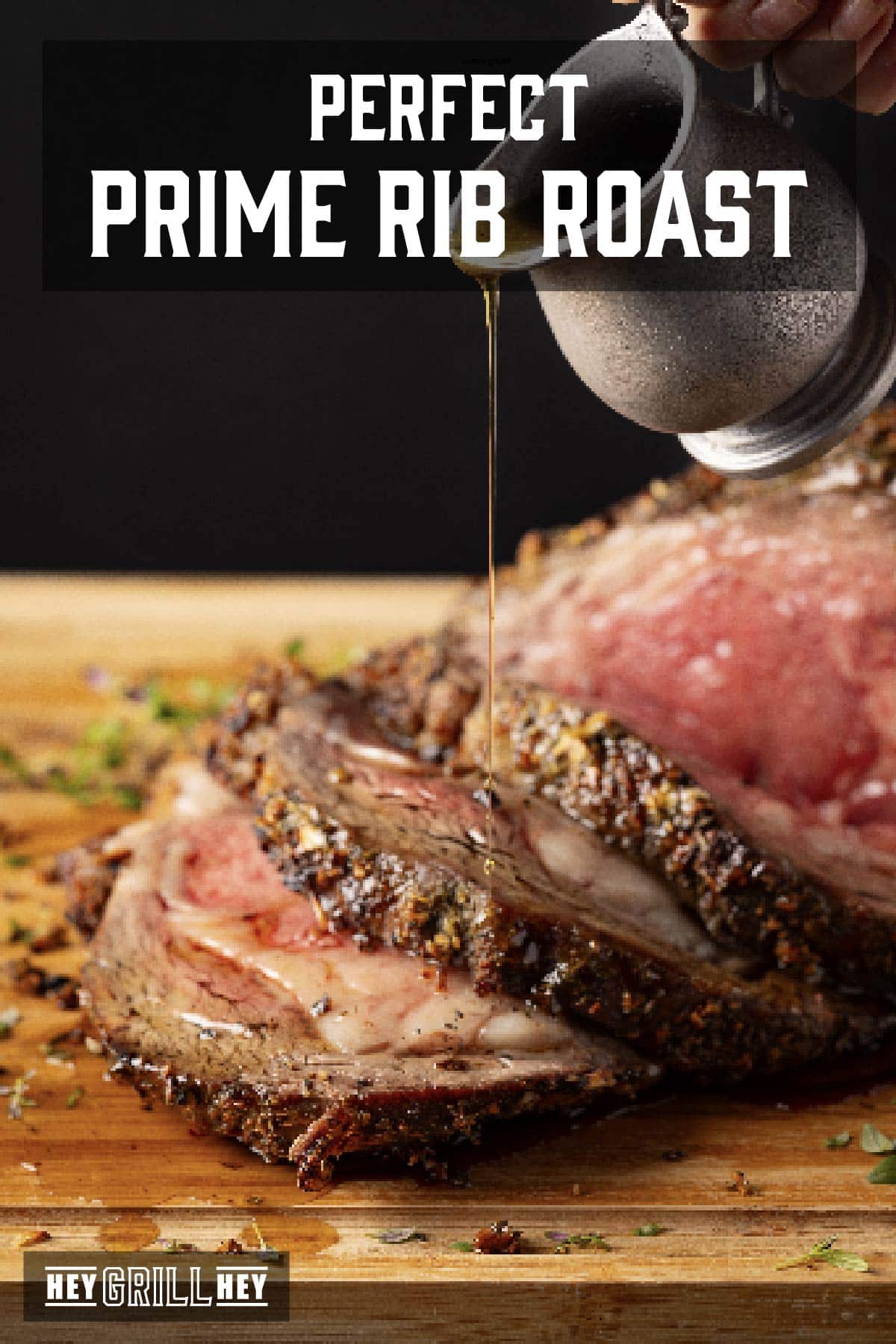
Slow Roasted Prime Rib Roast
When it comes to tender, juicy slabs of beef to celebrate a special occasion, nothing says indulge more than my Prime Rib Roast. This recipe infuses all that savory beef with thick buttery flavor and herby deliciousness. The best part is you can make it right in your kitchen oven, which means the smoker is free for all those savory sides.
An added bonus to preparing your prime rib in the oven is it allows you to catch all those yummy, melted, browned butter drippings as your crust develops. I cook my garlic butter prime rib on a rack above a baking sheet, and then when the roast is finished, I strain that gorgeous butter, season it with a little salt, and use that as a finishing sauce to drizzle over the sliced prime rib. It’s absolutely indulgent, and makes eating this prime rib a whole new experience.
Ingredients for Restaurant Style Rib Roast
The base of this recipe is super simple. All you need to season the roast is high-quality salt and black pepper (Adjust the 1 Tablespoon amounts here as needed to cover the entire roast).
- 8-10 pound bone-in prime rib roast
- 1 Tablespoon coarse ground salt
- 1 Tablespoon black pepper
For the garlic herb butter, you’ll need the following ingredients:
- 16 ounces softened butter
- 8 cloves minced garlic
- 2 sprigs of finely minced rosemary
- 2 sprigs of finely minced thyme
- 2 teaspoons salt
- 2 teaspoons black pepper
The flavors in the seasoned butter are inspired by the Resting Butter I use on grilled steaks. The idea is to enhance the beef’s natural flavor without overpowering its subtle earthiness. The butter has fresh garlic, fresh herbs, salt, and pepper. It’s simple but absolutely incredible. The garlic and herbs slow roast on the outside edges of the prime rib, giving it a most crave-able crust.
How Long to Cook Prime Rib
When you’re cooking a rare roast, plan approximately 35 minutes per pound at 225 degrees F. If you plan on serving your prime rib medium, then you need to plan on 40 minutes per pound. You also need to factor in 30 minutes of rest time and another 15 or so for the final sear. On top of all that, your times can vary based on grill and your cut of meat. The point is prime rib takes time, but it’s so worth it when your family sink their teeth into that mouthwatering beef.
Because internal temperature is so important to getting that crispy bark on the outside of your perfectly pink meat drizzled with garlic and herb butter, you should always use a reliable food thermometer. I always have my Thermapen ONE on hand, but any instant-read meat thermometer will take care of what you need.
Serving Suggestions
Prime rib is for special occasions, holiday dinners, and family gatherings. When you’re planning the best sides to serve with prime rib, you really can’t go wrong. You can choose some light yet succulent veggies to give you room for more rich and herby beef, or you can bring in more indulgent dishes for a family feast. Here are a few of my favorite companions for prime rib:
- Smoked Mashed Potatoes
- Baked Potatoes on the Grill
- Grilled Asparagus
- Grilled Carrots with a Balsamic Glaze
- Grilled Zucchini and Squash
How to Cook Prime Rib Roast
Cooking an amazing roast is totally doable with my easy, step-by-step process. Here’s how to make this garlic butter and then coat your prime rib in it to melt down into every savory morsel:
- Prep. Preheat your oven to 225 degrees F, and then trim the top of the roast down to 1/4 inch thick. Season the roast on all sides with salt and pepper.
- Season. Slather in garlic butter. Make the garlic butter in a small bowl, and then slather the roast on all sides with the butter.
- Bake. Place the buttered roast on a flat cooling rack above a rimmed baking sheet to catch any melted butter. Bake in your oven until the prime rib reaches 120 degrees F for Rare doneness, 125 degrees F for Medium-Rare, or 130 degrees F for Medium doneness.
- Rest. Remove the prime rib from the oven and rest for 20 minutes. Increase the temperature of your oven to 450 degrees F. Strain the butter and drippings from the baking sheet and set aside.
- Roast. Once your oven reaches 450 degrees F, return the roast to the flat roasting rack above a clean baking sheet and place in the oven. Roast until the meat reaches your preferred final doneness (130 degrees F for Rare, 135 degrees F for Medium-Rare, or 140 degrees F for Medium).
- Enjoy. Remove the garlic butter prime rib from the oven and rest for around 15 minutes. Drizzle with the reserved drippings before slicing with a sharp knife and serving.
More Ways to Enjoy Savory Roasts
Once you see how easy it is to make savory, banquet-quality prime rib in your kitchen oven, you’ll want to make it all the time. As soon as your family bite into that tender, juicy, indulgent beef, then you won’t have much choice. Here are few more of my favorite ways to prepare this beautiful cut of beef, which are all available in the Hey Grill Hey app:
- Garlic Herb Stuffed Prime Rib
- Prime Rib on the Grill
- Smoked Prime Rib Roast
- Smoked Garlic Butter Prime Rib
Oven Prime Rib Roast Recipe
Give some love to your oven, and try this amazing Prime Rib Roast in your conventional oven. If you love making it then be sure it give it a 5 star rating. If this savory and indulgent prime rib recipe has your mouth watering for more, then check out our Smoked Prime Rib Pitmaster Class in The Grill Squad. Susie and guests give in-depth knowledge on all your favorite proteins, and more.
If you still can’t get enough Hey Grill Hey in your life, then you need to follow us on YouTube, Instagram, and Facebook. You never know when a handy tip will take your grill game to the next level and help you become a backyard BBQ hero.
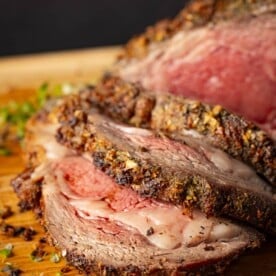
Prime Rib Roast in the Oven
Video
Ingredients
- 1 8-10 pound bone-in prime rib roast
Garlic Herb Butter
- 16 ounces butter softened
- 8 cloves garlic minced
- 2 sprigs fresh rosemary finely minced
- 2 sprigs fresh thyme leaves finely minced
- 2 teaspoons salt
- 2 teaspoons black pepper
Instructions
- Preheat. Preheat your oven to 225 degrees F.
- Prep the prime rib. While the oven is warming up, prepare your roast. Trim any excess fat from the top of the roast down to 1/4 inch thick. Season on all sides with an even sprinkling of salt and pepper.1 8-10 pound bone-in prime rib roast
- Slather in garlic butter. In a small bowl combine the softened butter, garlic, herbs, salt, and pepper. Slather the entire roast with the garlic butter.16 ounces butter, 8 cloves garlic, 2 sprigs fresh rosemary, 2 sprigs fresh thyme leaves, 2 teaspoons salt, 2 teaspoons black pepper
- Bake. Place the roast on a flat cooling rack set on a baking sheet. The baking sheet will catch any melted butter. Close your oven, and bake the roast until the internal temperature reaches 120 degrees F for Rare or 128 degrees F for Medium. For a rare, bone-in roast, plan on 35 minutes per pound of prime rib.
- Rest. Remove the roast to a cutting board and allow to rest for 20 minutes. Strain the butter and drippings from the baking sheet into a separate bowl and set aside. While the roast is resting, increase the temperature of your oven to 450 degrees F.
- Roast. Once the oven is up to temperature, it is time to roast. Return the roast to the flat roasting rack above a clean baking sheet and place in the oven. Pull the roast out of the oven at 130 degrees F internal temperature for rare, 135 for medium rare, or 140 for medium. This process should go quickly, so keep a close eye on your temperature.
- Rest, slice, and serve. Remove the prime rib to the cutting board and let the meat rest for at least 15 minutes before slicing and serving. Drizzle the reserved butter and drippings over the roast for an extra decadent finish.
Nutrition
Nutrition information is automatically calculated, so should only be used as an approximation.
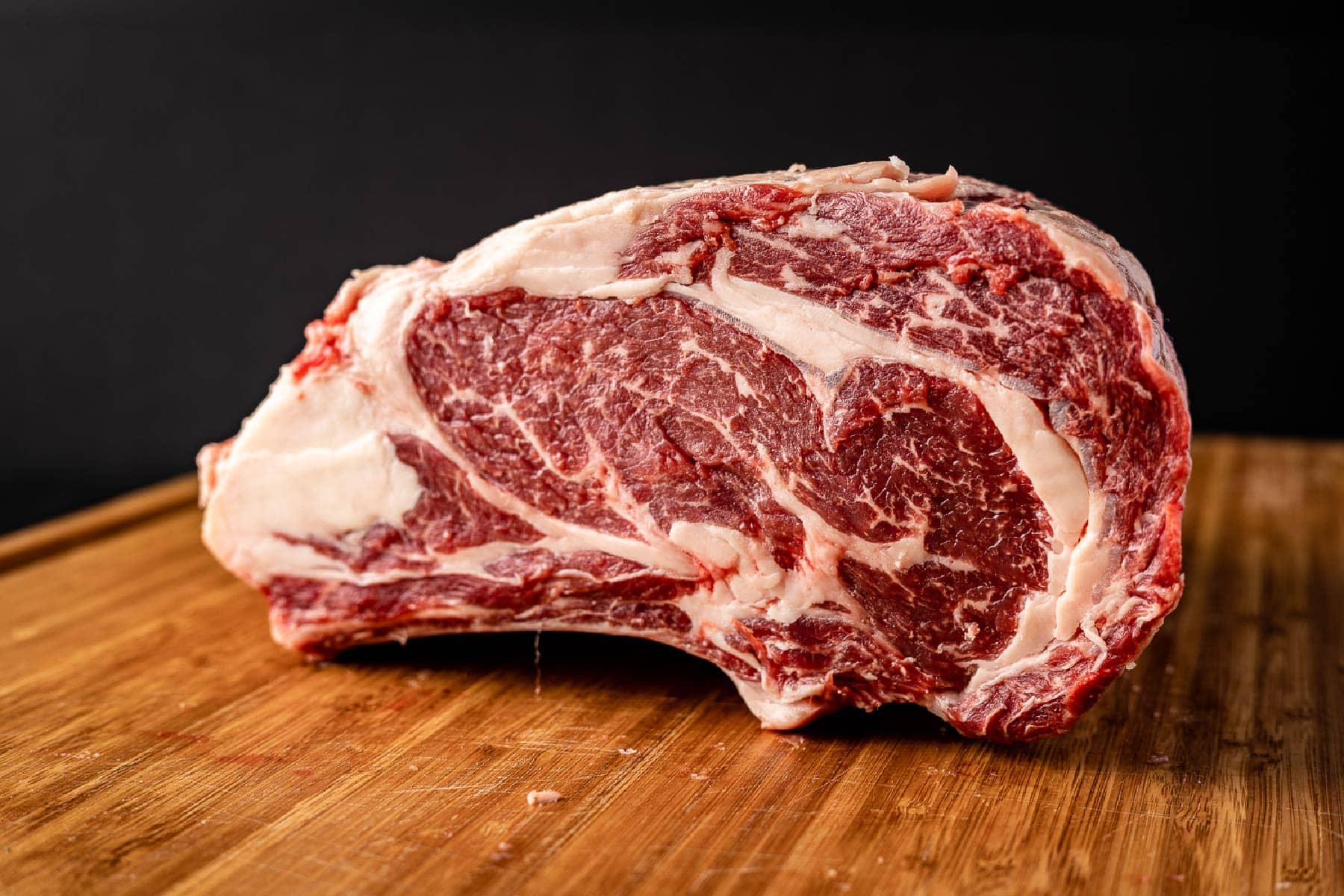
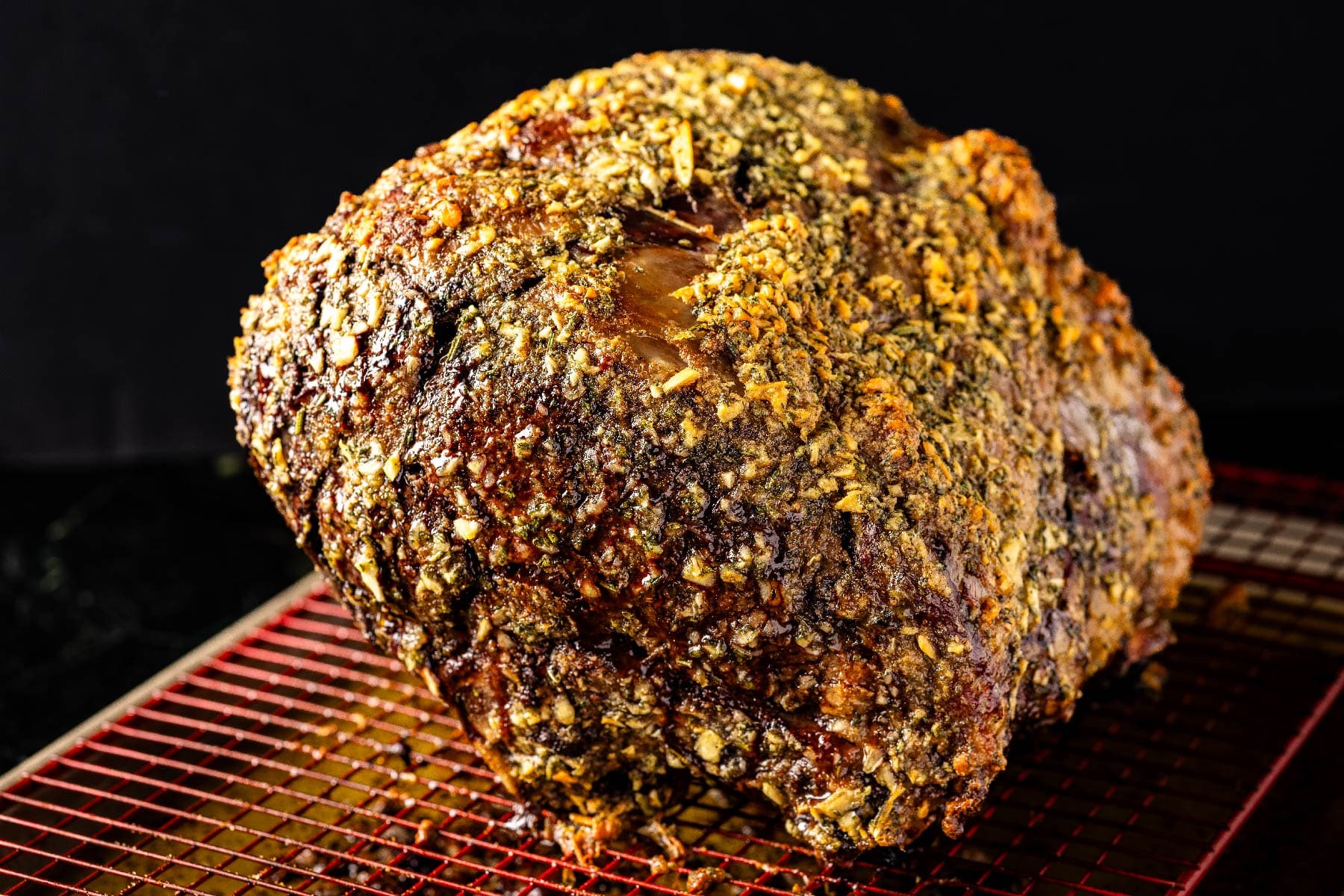
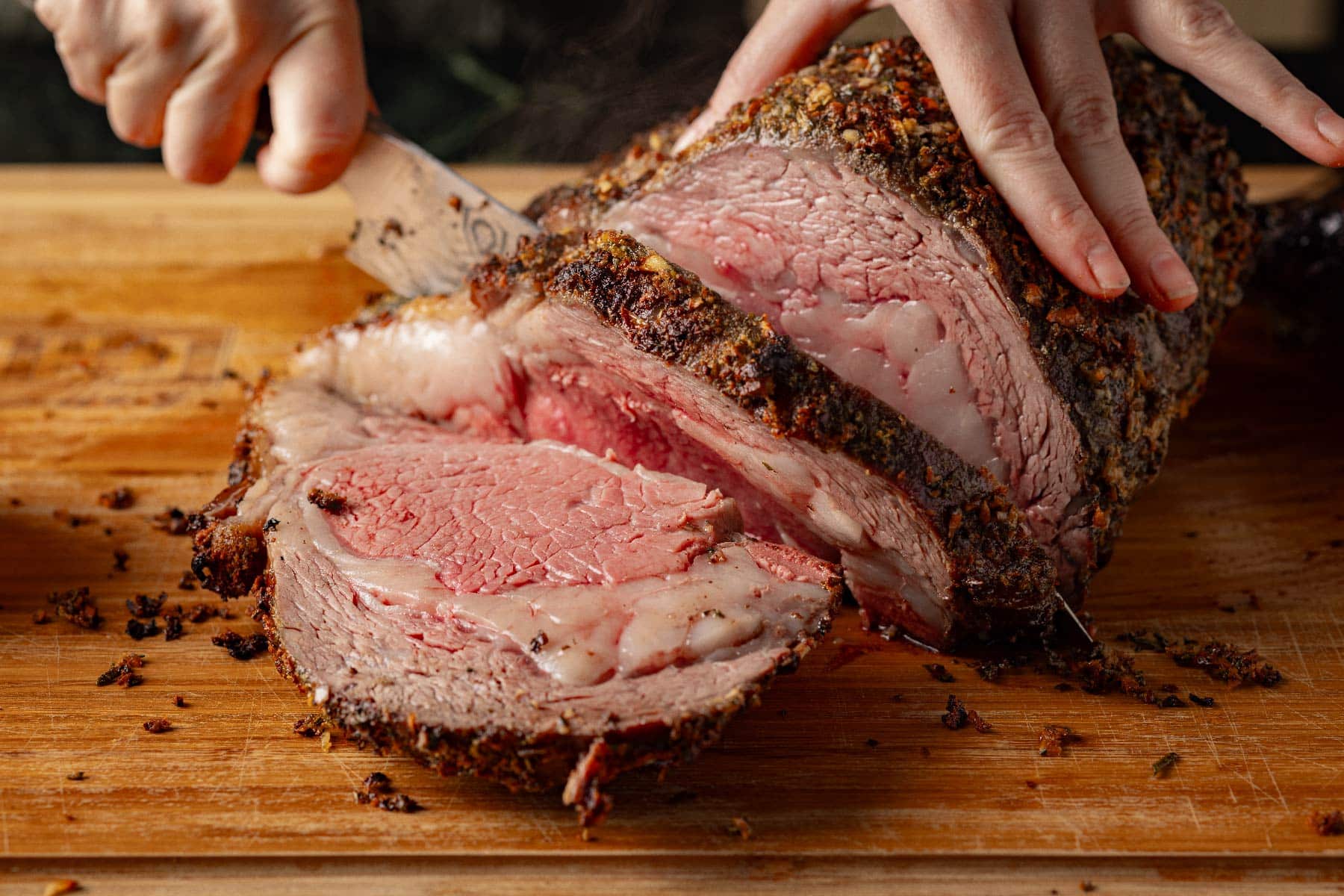
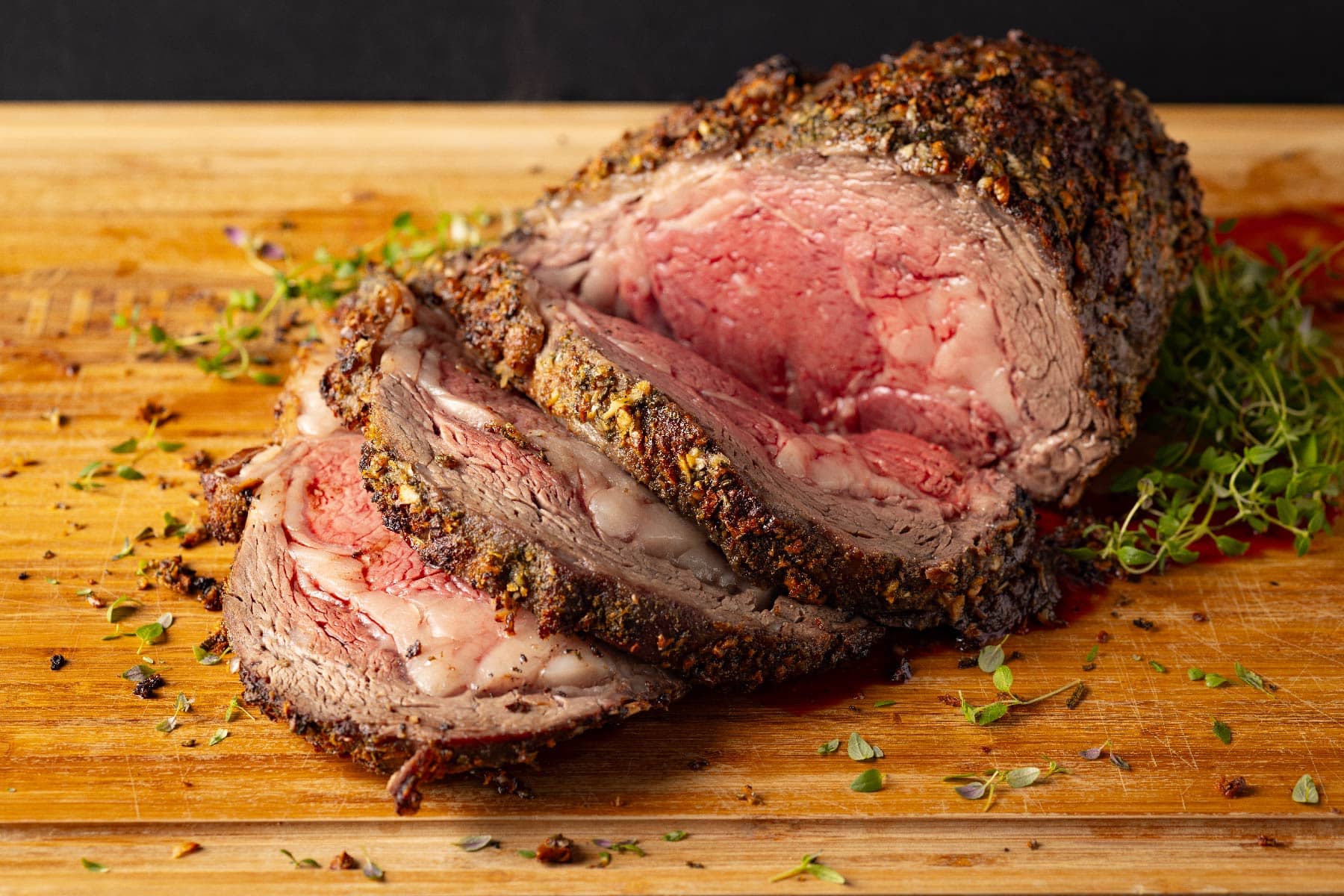
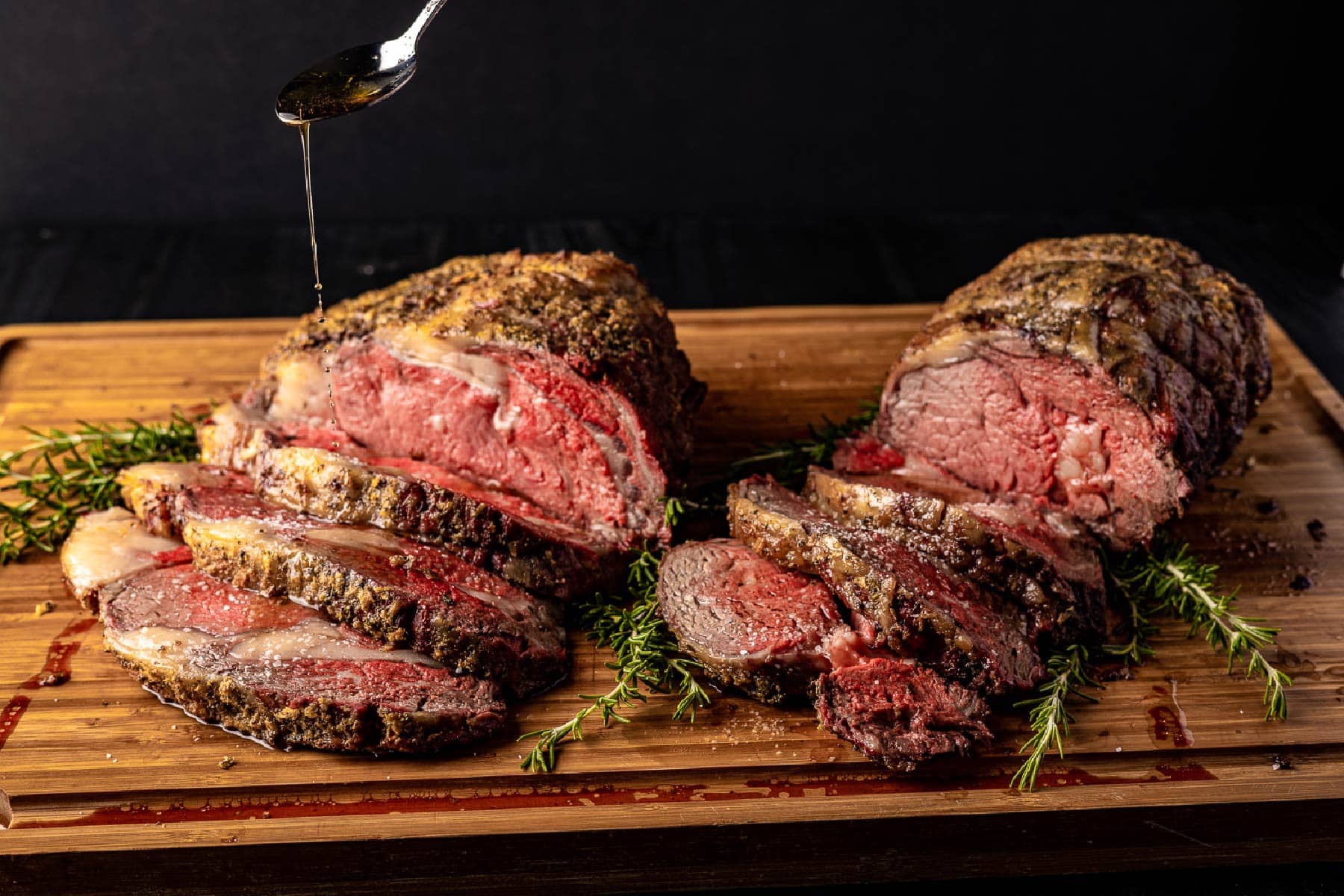
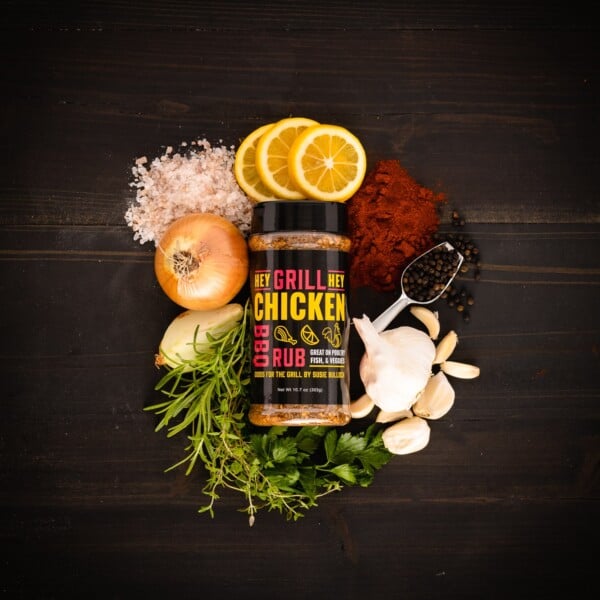
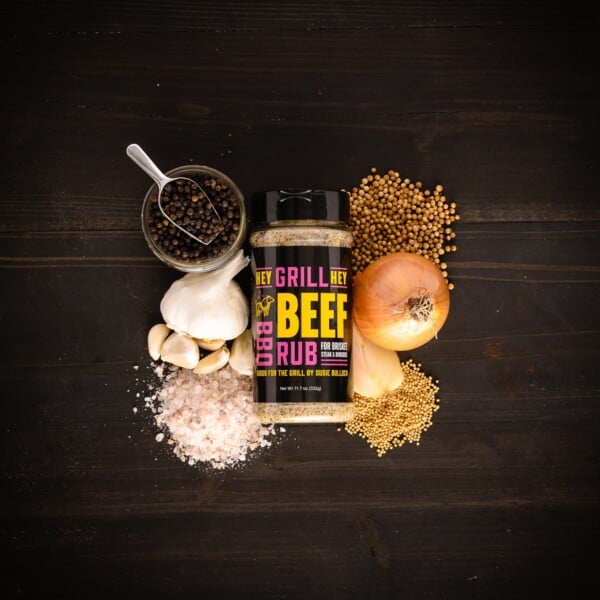
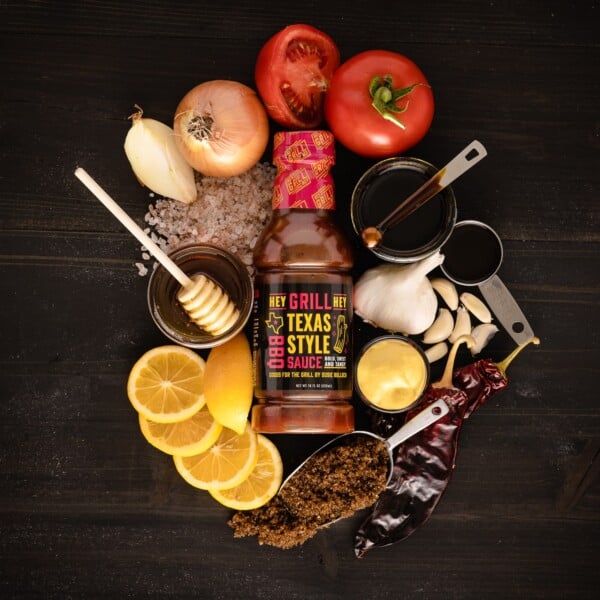
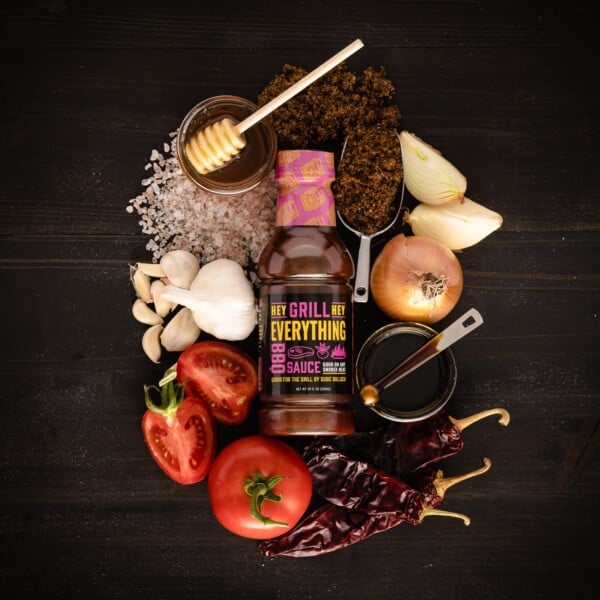
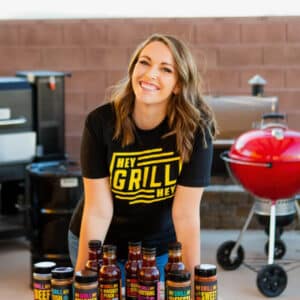
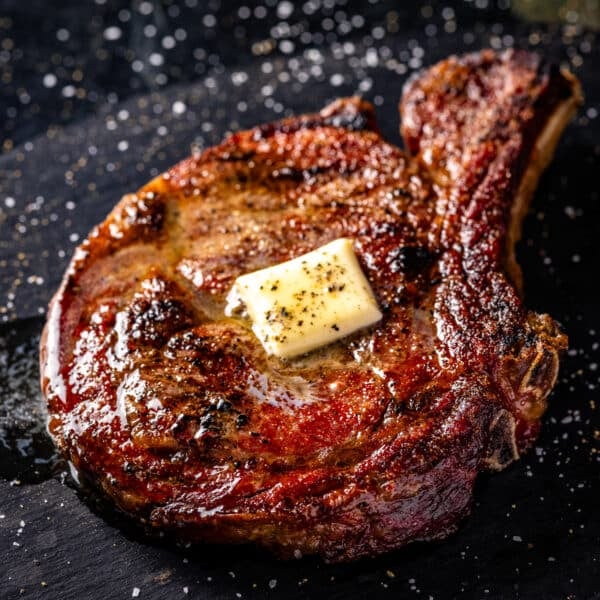
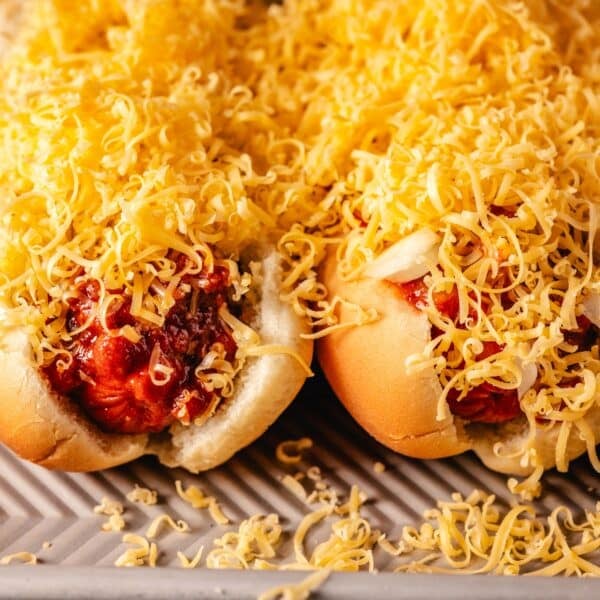
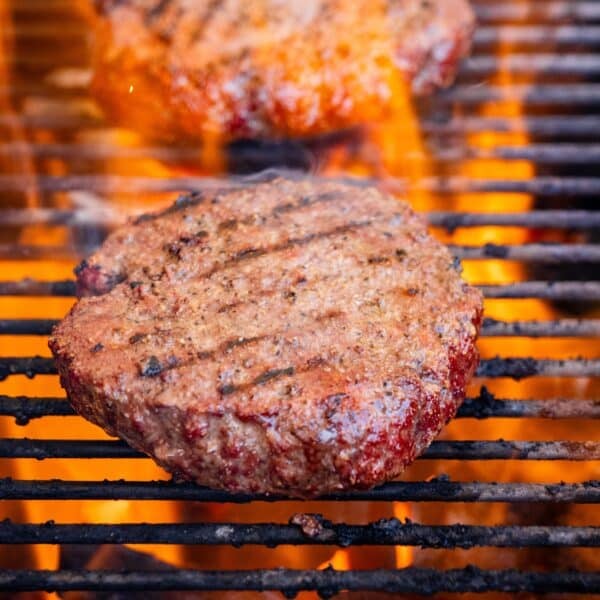
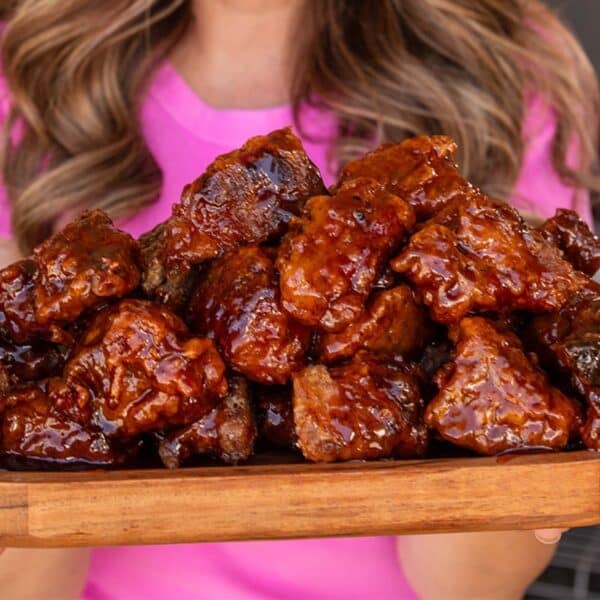





The perfect way to smoke a boneless rib roast for Easter Dinner. The recipe was spot on, no changes required. My family is still raving about it!
Perfect
best oven roasted prime rib recipe I have ever found. I usually do mine on the smoker. I was just too lazy this christmas.
This recipe is right on the money! Follows it exactly and the meat turned out perfectly!
You have the best recipe thank you
EXCELLENT recipe that I attempted on Christmas Eve 2024 and it turned out great! I love how Hey Grill Hey gives detailed instructions and usually a video. Every recipe I have ever tried has turned out superb! This oven cooked Prime Rib Roast turned out fantastic! Excellent flavor, easy to repeat the recipe, but give yourself plenty of time for cooking. You will not be disappointed with this tender and tasty rib roast!
followed your recipe to the T and it was perfect Christmas dinner.
I’ve been using this method by Susie for 5 years and it’s my favorite for Prime Rib. The garlic herb butter is magic and whether done in the smoker or oven the results are always fantastic.